Cross-Cultural Challenges for Worldpay and Vantiv Merger Report
VerifiedAdded on 2022/12/27
|12
|2180
|22
Report
AI Summary
This report analyzes the cross-cultural challenges Worldpay faces when merging with Vantiv, a US-based payment processing company. It begins with an introduction to cross-cultural management and the impact of globalization, highlighting both its benefits and drawbacks. The report then delves into the Hofstede model to compare cultural dimensions between the UK and the US, focusing on power distance, individualism, masculinity, uncertainty avoidance, and long-term orientation. The core of the report examines the challenges in decision-making, negotiation & communication, leadership & cultural intelligence, within the context of the merger. It emphasizes the importance of understanding cultural differences, promoting effective communication, and fostering cultural intelligence to build successful international teams. The report concludes with recommendations for human resource practices, cultural research, and promoting appreciation for cultural values to facilitate a smooth merger process. References to relevant academic sources are included throughout the analysis.

Running Head: BUSINESS ETHICS
Business Ethics
Name of the Student
Name of the University
Author Note
Business Ethics
Name of the Student
Name of the University
Author Note
Paraphrase This Document
Need a fresh take? Get an instant paraphrase of this document with our AI Paraphraser
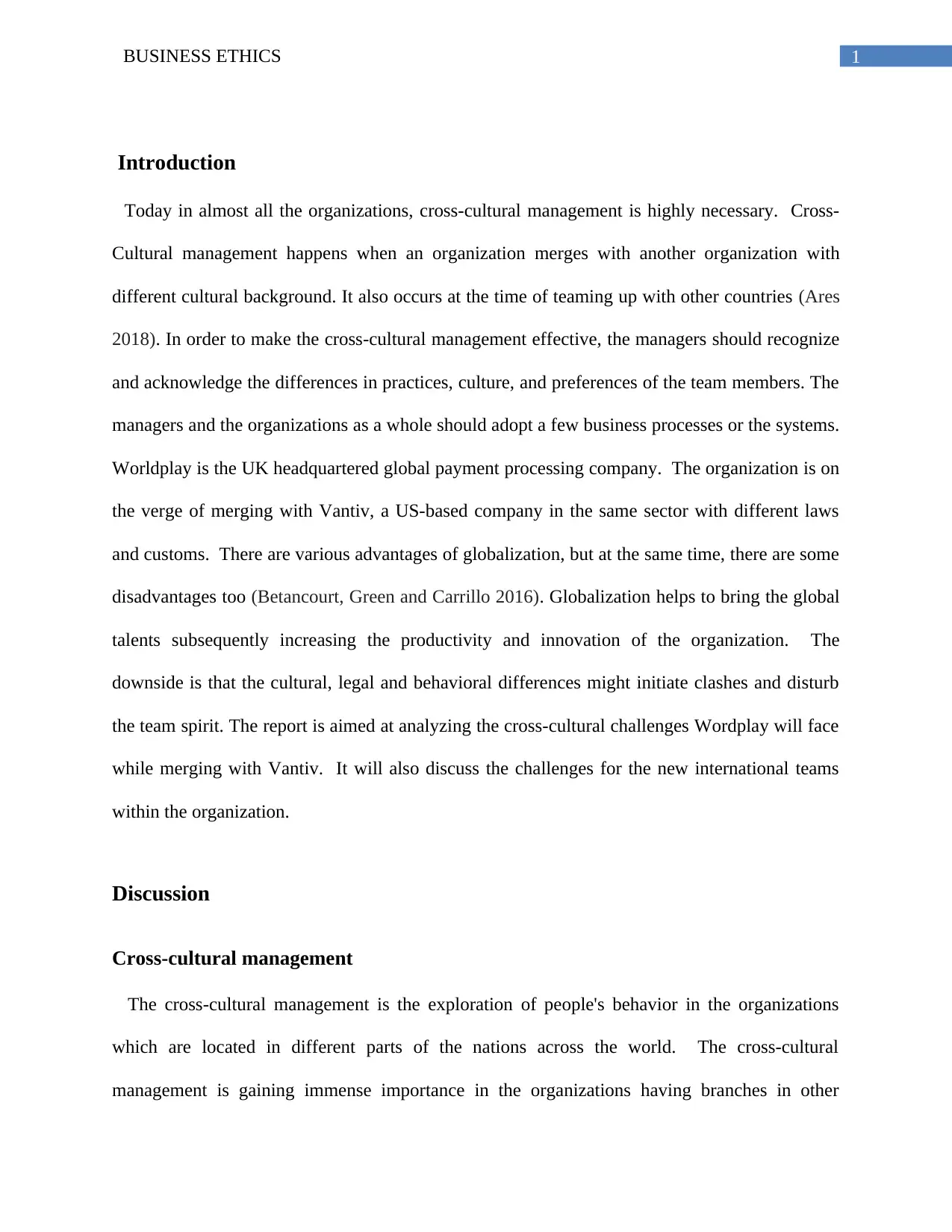
1BUSINESS ETHICS
Introduction
Today in almost all the organizations, cross-cultural management is highly necessary. Cross-
Cultural management happens when an organization merges with another organization with
different cultural background. It also occurs at the time of teaming up with other countries (Ares
2018). In order to make the cross-cultural management effective, the managers should recognize
and acknowledge the differences in practices, culture, and preferences of the team members. The
managers and the organizations as a whole should adopt a few business processes or the systems.
Worldplay is the UK headquartered global payment processing company. The organization is on
the verge of merging with Vantiv, a US-based company in the same sector with different laws
and customs. There are various advantages of globalization, but at the same time, there are some
disadvantages too (Betancourt, Green and Carrillo 2016). Globalization helps to bring the global
talents subsequently increasing the productivity and innovation of the organization. The
downside is that the cultural, legal and behavioral differences might initiate clashes and disturb
the team spirit. The report is aimed at analyzing the cross-cultural challenges Wordplay will face
while merging with Vantiv. It will also discuss the challenges for the new international teams
within the organization.
Discussion
Cross-cultural management
The cross-cultural management is the exploration of people's behavior in the organizations
which are located in different parts of the nations across the world. The cross-cultural
management is gaining immense importance in the organizations having branches in other
Introduction
Today in almost all the organizations, cross-cultural management is highly necessary. Cross-
Cultural management happens when an organization merges with another organization with
different cultural background. It also occurs at the time of teaming up with other countries (Ares
2018). In order to make the cross-cultural management effective, the managers should recognize
and acknowledge the differences in practices, culture, and preferences of the team members. The
managers and the organizations as a whole should adopt a few business processes or the systems.
Worldplay is the UK headquartered global payment processing company. The organization is on
the verge of merging with Vantiv, a US-based company in the same sector with different laws
and customs. There are various advantages of globalization, but at the same time, there are some
disadvantages too (Betancourt, Green and Carrillo 2016). Globalization helps to bring the global
talents subsequently increasing the productivity and innovation of the organization. The
downside is that the cultural, legal and behavioral differences might initiate clashes and disturb
the team spirit. The report is aimed at analyzing the cross-cultural challenges Wordplay will face
while merging with Vantiv. It will also discuss the challenges for the new international teams
within the organization.
Discussion
Cross-cultural management
The cross-cultural management is the exploration of people's behavior in the organizations
which are located in different parts of the nations across the world. The cross-cultural
management is gaining immense importance in the organizations having branches in other
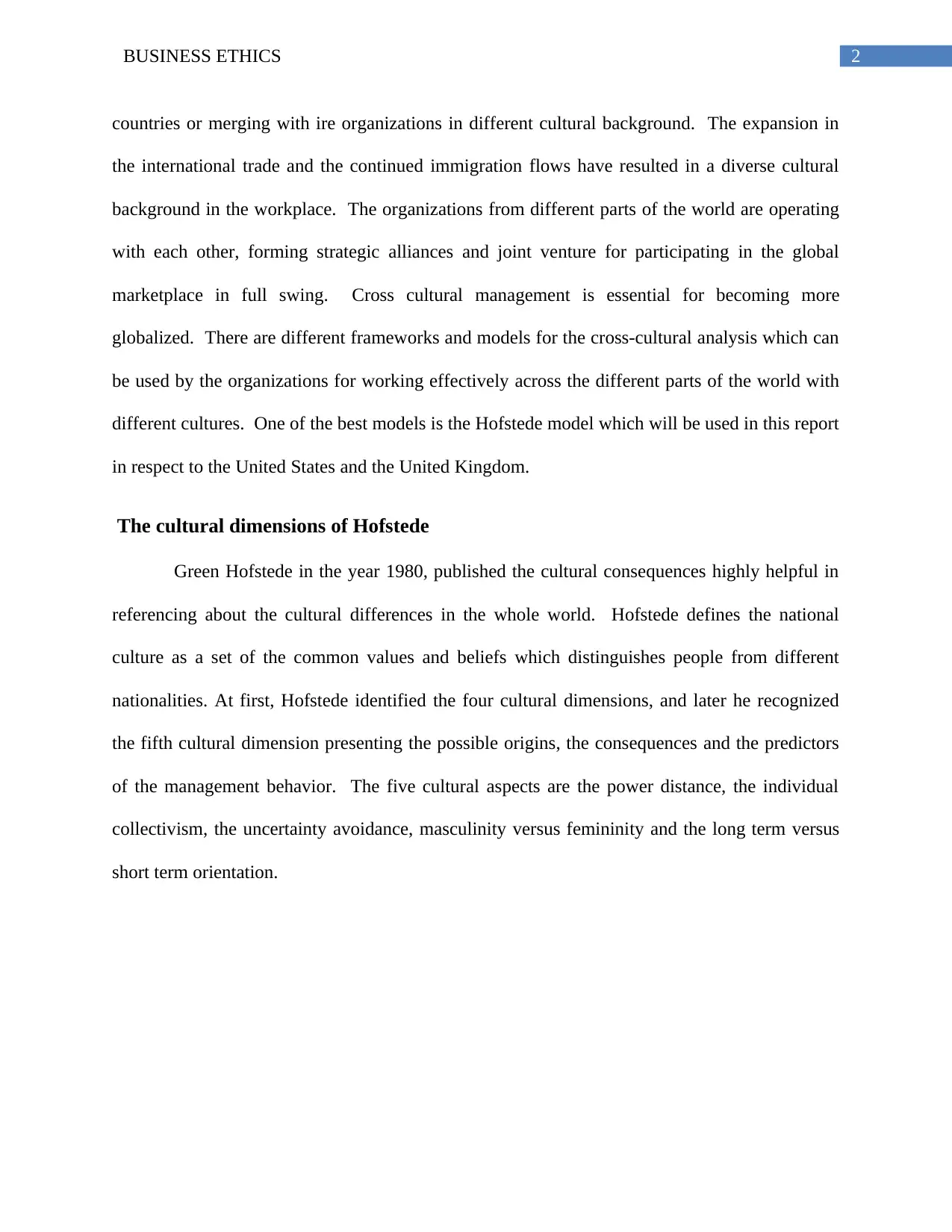
2BUSINESS ETHICS
countries or merging with ire organizations in different cultural background. The expansion in
the international trade and the continued immigration flows have resulted in a diverse cultural
background in the workplace. The organizations from different parts of the world are operating
with each other, forming strategic alliances and joint venture for participating in the global
marketplace in full swing. Cross cultural management is essential for becoming more
globalized. There are different frameworks and models for the cross-cultural analysis which can
be used by the organizations for working effectively across the different parts of the world with
different cultures. One of the best models is the Hofstede model which will be used in this report
in respect to the United States and the United Kingdom.
The cultural dimensions of Hofstede
Green Hofstede in the year 1980, published the cultural consequences highly helpful in
referencing about the cultural differences in the whole world. Hofstede defines the national
culture as a set of the common values and beliefs which distinguishes people from different
nationalities. At first, Hofstede identified the four cultural dimensions, and later he recognized
the fifth cultural dimension presenting the possible origins, the consequences and the predictors
of the management behavior. The five cultural aspects are the power distance, the individual
collectivism, the uncertainty avoidance, masculinity versus femininity and the long term versus
short term orientation.
countries or merging with ire organizations in different cultural background. The expansion in
the international trade and the continued immigration flows have resulted in a diverse cultural
background in the workplace. The organizations from different parts of the world are operating
with each other, forming strategic alliances and joint venture for participating in the global
marketplace in full swing. Cross cultural management is essential for becoming more
globalized. There are different frameworks and models for the cross-cultural analysis which can
be used by the organizations for working effectively across the different parts of the world with
different cultures. One of the best models is the Hofstede model which will be used in this report
in respect to the United States and the United Kingdom.
The cultural dimensions of Hofstede
Green Hofstede in the year 1980, published the cultural consequences highly helpful in
referencing about the cultural differences in the whole world. Hofstede defines the national
culture as a set of the common values and beliefs which distinguishes people from different
nationalities. At first, Hofstede identified the four cultural dimensions, and later he recognized
the fifth cultural dimension presenting the possible origins, the consequences and the predictors
of the management behavior. The five cultural aspects are the power distance, the individual
collectivism, the uncertainty avoidance, masculinity versus femininity and the long term versus
short term orientation.
⊘ This is a preview!⊘
Do you want full access?
Subscribe today to unlock all pages.

Trusted by 1+ million students worldwide
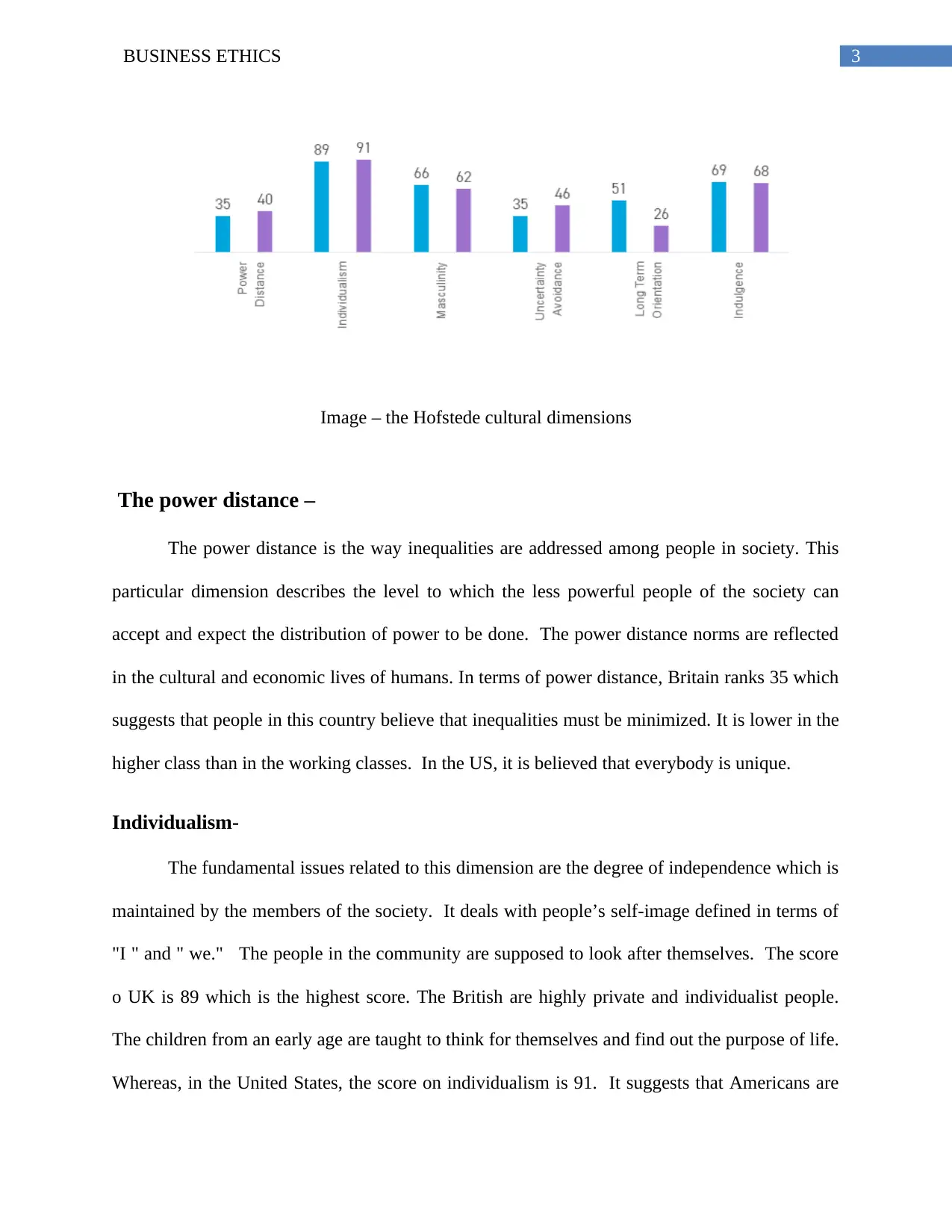
3BUSINESS ETHICS
Image – the Hofstede cultural dimensions
The power distance –
The power distance is the way inequalities are addressed among people in society. This
particular dimension describes the level to which the less powerful people of the society can
accept and expect the distribution of power to be done. The power distance norms are reflected
in the cultural and economic lives of humans. In terms of power distance, Britain ranks 35 which
suggests that people in this country believe that inequalities must be minimized. It is lower in the
higher class than in the working classes. In the US, it is believed that everybody is unique.
Individualism-
The fundamental issues related to this dimension are the degree of independence which is
maintained by the members of the society. It deals with people’s self-image defined in terms of
"I " and " we." The people in the community are supposed to look after themselves. The score
o UK is 89 which is the highest score. The British are highly private and individualist people.
The children from an early age are taught to think for themselves and find out the purpose of life.
Whereas, in the United States, the score on individualism is 91. It suggests that Americans are
Image – the Hofstede cultural dimensions
The power distance –
The power distance is the way inequalities are addressed among people in society. This
particular dimension describes the level to which the less powerful people of the society can
accept and expect the distribution of power to be done. The power distance norms are reflected
in the cultural and economic lives of humans. In terms of power distance, Britain ranks 35 which
suggests that people in this country believe that inequalities must be minimized. It is lower in the
higher class than in the working classes. In the US, it is believed that everybody is unique.
Individualism-
The fundamental issues related to this dimension are the degree of independence which is
maintained by the members of the society. It deals with people’s self-image defined in terms of
"I " and " we." The people in the community are supposed to look after themselves. The score
o UK is 89 which is the highest score. The British are highly private and individualist people.
The children from an early age are taught to think for themselves and find out the purpose of life.
Whereas, in the United States, the score on individualism is 91. It suggests that Americans are
Paraphrase This Document
Need a fresh take? Get an instant paraphrase of this document with our AI Paraphraser
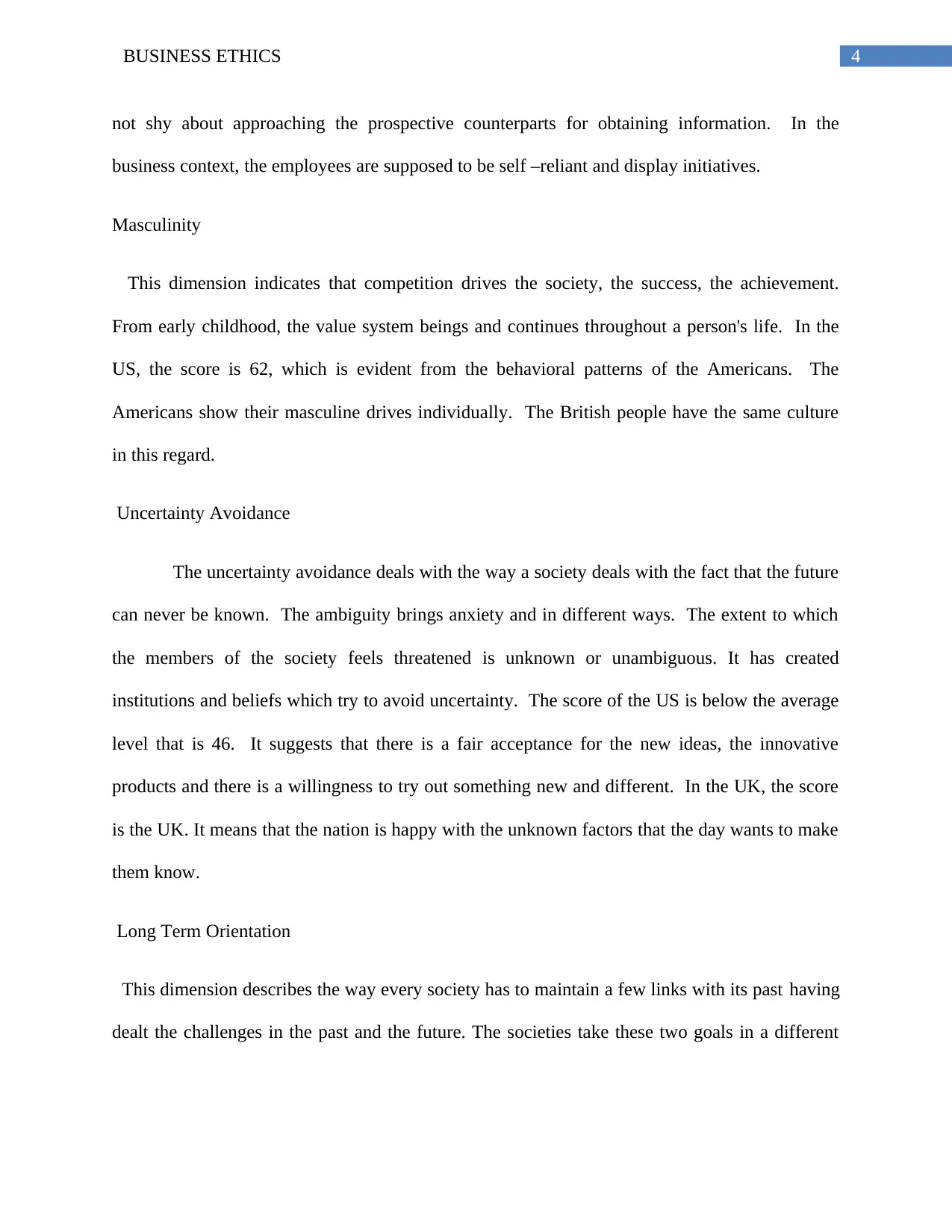
4BUSINESS ETHICS
not shy about approaching the prospective counterparts for obtaining information. In the
business context, the employees are supposed to be self –reliant and display initiatives.
Masculinity
This dimension indicates that competition drives the society, the success, the achievement.
From early childhood, the value system beings and continues throughout a person's life. In the
US, the score is 62, which is evident from the behavioral patterns of the Americans. The
Americans show their masculine drives individually. The British people have the same culture
in this regard.
Uncertainty Avoidance
The uncertainty avoidance deals with the way a society deals with the fact that the future
can never be known. The ambiguity brings anxiety and in different ways. The extent to which
the members of the society feels threatened is unknown or unambiguous. It has created
institutions and beliefs which try to avoid uncertainty. The score of the US is below the average
level that is 46. It suggests that there is a fair acceptance for the new ideas, the innovative
products and there is a willingness to try out something new and different. In the UK, the score
is the UK. It means that the nation is happy with the unknown factors that the day wants to make
them know.
Long Term Orientation
This dimension describes the way every society has to maintain a few links with its past having
dealt the challenges in the past and the future. The societies take these two goals in a different
not shy about approaching the prospective counterparts for obtaining information. In the
business context, the employees are supposed to be self –reliant and display initiatives.
Masculinity
This dimension indicates that competition drives the society, the success, the achievement.
From early childhood, the value system beings and continues throughout a person's life. In the
US, the score is 62, which is evident from the behavioral patterns of the Americans. The
Americans show their masculine drives individually. The British people have the same culture
in this regard.
Uncertainty Avoidance
The uncertainty avoidance deals with the way a society deals with the fact that the future
can never be known. The ambiguity brings anxiety and in different ways. The extent to which
the members of the society feels threatened is unknown or unambiguous. It has created
institutions and beliefs which try to avoid uncertainty. The score of the US is below the average
level that is 46. It suggests that there is a fair acceptance for the new ideas, the innovative
products and there is a willingness to try out something new and different. In the UK, the score
is the UK. It means that the nation is happy with the unknown factors that the day wants to make
them know.
Long Term Orientation
This dimension describes the way every society has to maintain a few links with its past having
dealt the challenges in the past and the future. The societies take these two goals in a different
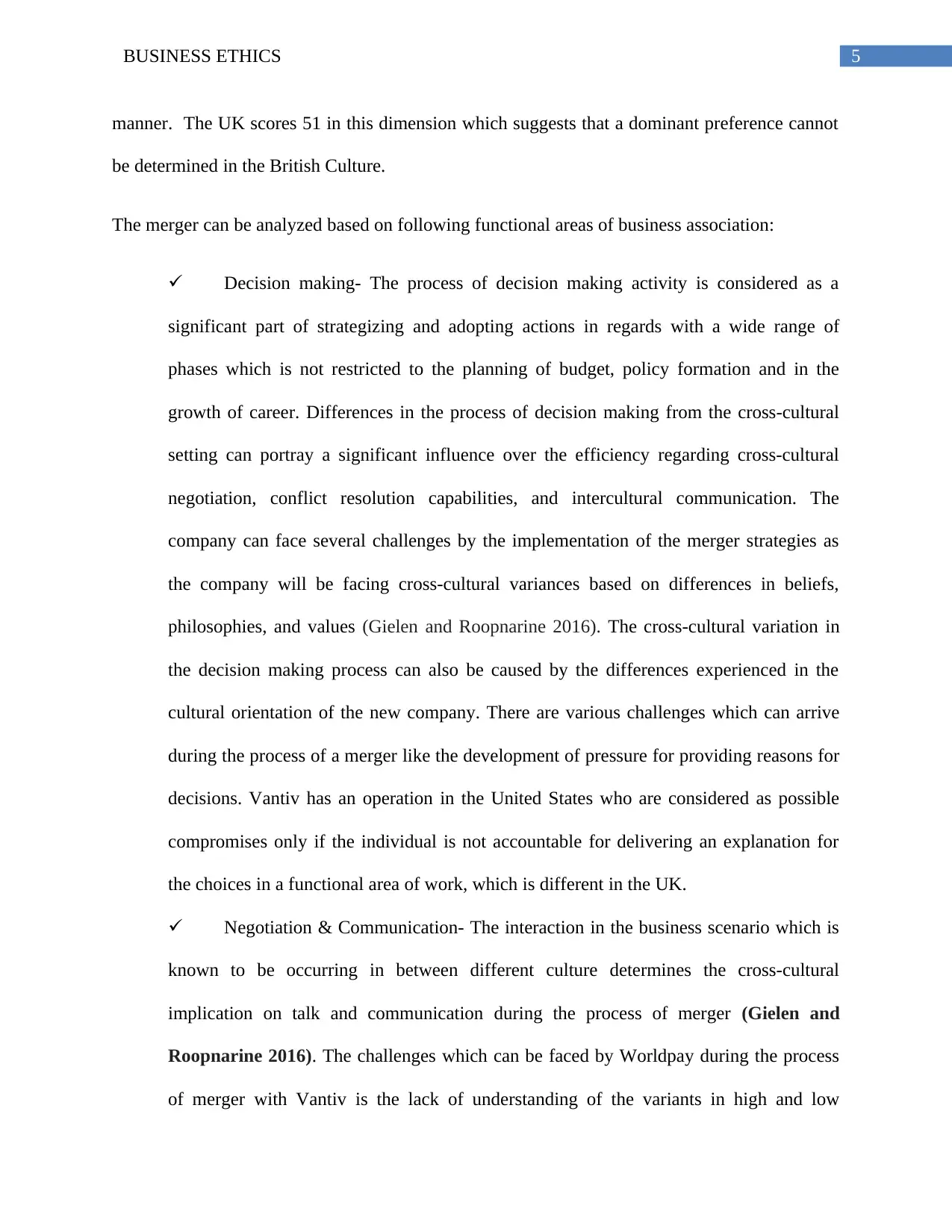
5BUSINESS ETHICS
manner. The UK scores 51 in this dimension which suggests that a dominant preference cannot
be determined in the British Culture.
The merger can be analyzed based on following functional areas of business association:
Decision making- The process of decision making activity is considered as a
significant part of strategizing and adopting actions in regards with a wide range of
phases which is not restricted to the planning of budget, policy formation and in the
growth of career. Differences in the process of decision making from the cross-cultural
setting can portray a significant influence over the efficiency regarding cross-cultural
negotiation, conflict resolution capabilities, and intercultural communication. The
company can face several challenges by the implementation of the merger strategies as
the company will be facing cross-cultural variances based on differences in beliefs,
philosophies, and values (Gielen and Roopnarine 2016). The cross-cultural variation in
the decision making process can also be caused by the differences experienced in the
cultural orientation of the new company. There are various challenges which can arrive
during the process of a merger like the development of pressure for providing reasons for
decisions. Vantiv has an operation in the United States who are considered as possible
compromises only if the individual is not accountable for delivering an explanation for
the choices in a functional area of work, which is different in the UK.
Negotiation & Communication- The interaction in the business scenario which is
known to be occurring in between different culture determines the cross-cultural
implication on talk and communication during the process of merger (Gielen and
Roopnarine 2016). The challenges which can be faced by Worldpay during the process
of merger with Vantiv is the lack of understanding of the variants in high and low
manner. The UK scores 51 in this dimension which suggests that a dominant preference cannot
be determined in the British Culture.
The merger can be analyzed based on following functional areas of business association:
Decision making- The process of decision making activity is considered as a
significant part of strategizing and adopting actions in regards with a wide range of
phases which is not restricted to the planning of budget, policy formation and in the
growth of career. Differences in the process of decision making from the cross-cultural
setting can portray a significant influence over the efficiency regarding cross-cultural
negotiation, conflict resolution capabilities, and intercultural communication. The
company can face several challenges by the implementation of the merger strategies as
the company will be facing cross-cultural variances based on differences in beliefs,
philosophies, and values (Gielen and Roopnarine 2016). The cross-cultural variation in
the decision making process can also be caused by the differences experienced in the
cultural orientation of the new company. There are various challenges which can arrive
during the process of a merger like the development of pressure for providing reasons for
decisions. Vantiv has an operation in the United States who are considered as possible
compromises only if the individual is not accountable for delivering an explanation for
the choices in a functional area of work, which is different in the UK.
Negotiation & Communication- The interaction in the business scenario which is
known to be occurring in between different culture determines the cross-cultural
implication on talk and communication during the process of merger (Gielen and
Roopnarine 2016). The challenges which can be faced by Worldpay during the process
of merger with Vantiv is the lack of understanding of the variants in high and low
⊘ This is a preview!⊘
Do you want full access?
Subscribe today to unlock all pages.

Trusted by 1+ million students worldwide
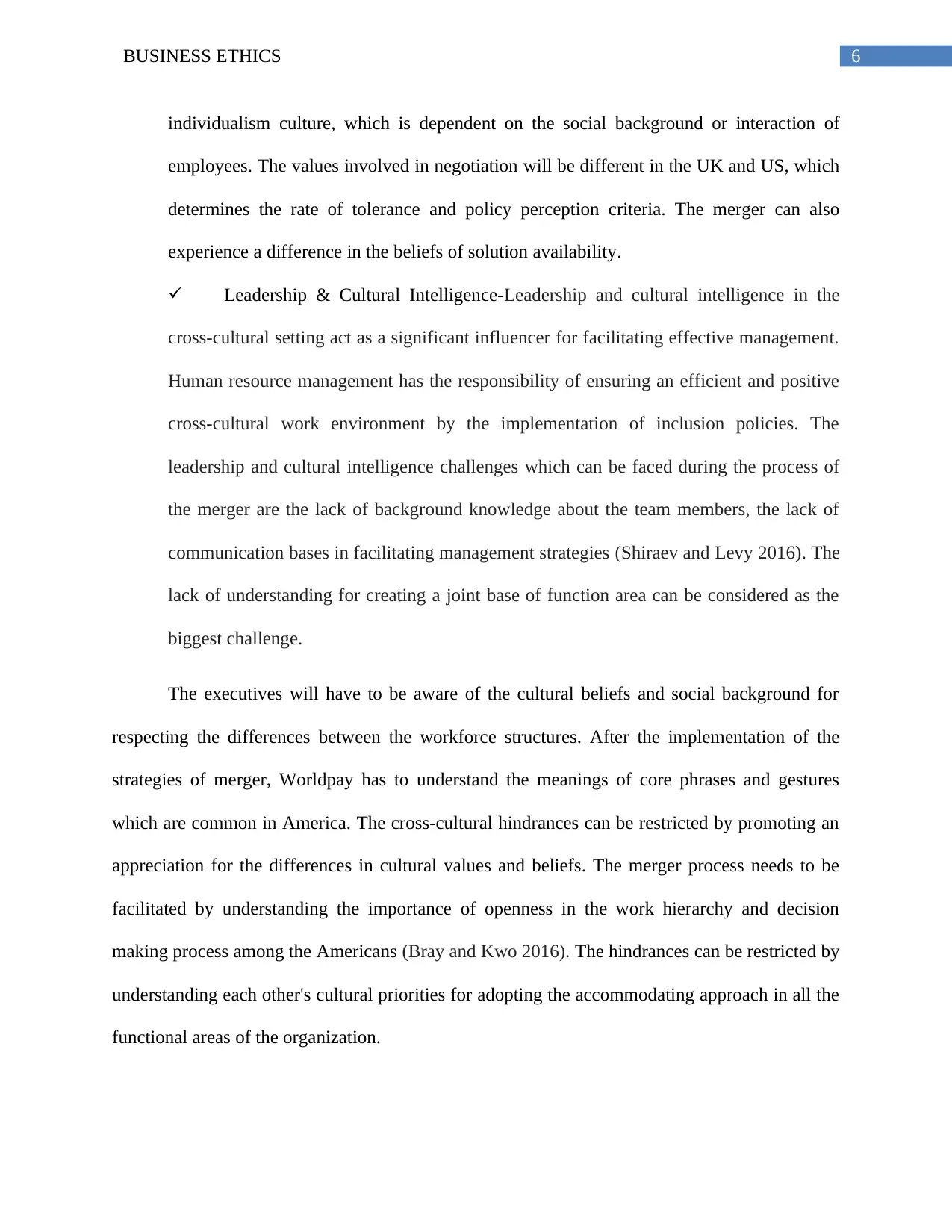
6BUSINESS ETHICS
individualism culture, which is dependent on the social background or interaction of
employees. The values involved in negotiation will be different in the UK and US, which
determines the rate of tolerance and policy perception criteria. The merger can also
experience a difference in the beliefs of solution availability.
Leadership & Cultural Intelligence-Leadership and cultural intelligence in the
cross-cultural setting act as a significant influencer for facilitating effective management.
Human resource management has the responsibility of ensuring an efficient and positive
cross-cultural work environment by the implementation of inclusion policies. The
leadership and cultural intelligence challenges which can be faced during the process of
the merger are the lack of background knowledge about the team members, the lack of
communication bases in facilitating management strategies (Shiraev and Levy 2016). The
lack of understanding for creating a joint base of function area can be considered as the
biggest challenge.
The executives will have to be aware of the cultural beliefs and social background for
respecting the differences between the workforce structures. After the implementation of the
strategies of merger, Worldpay has to understand the meanings of core phrases and gestures
which are common in America. The cross-cultural hindrances can be restricted by promoting an
appreciation for the differences in cultural values and beliefs. The merger process needs to be
facilitated by understanding the importance of openness in the work hierarchy and decision
making process among the Americans (Bray and Kwo 2016). The hindrances can be restricted by
understanding each other's cultural priorities for adopting the accommodating approach in all the
functional areas of the organization.
individualism culture, which is dependent on the social background or interaction of
employees. The values involved in negotiation will be different in the UK and US, which
determines the rate of tolerance and policy perception criteria. The merger can also
experience a difference in the beliefs of solution availability.
Leadership & Cultural Intelligence-Leadership and cultural intelligence in the
cross-cultural setting act as a significant influencer for facilitating effective management.
Human resource management has the responsibility of ensuring an efficient and positive
cross-cultural work environment by the implementation of inclusion policies. The
leadership and cultural intelligence challenges which can be faced during the process of
the merger are the lack of background knowledge about the team members, the lack of
communication bases in facilitating management strategies (Shiraev and Levy 2016). The
lack of understanding for creating a joint base of function area can be considered as the
biggest challenge.
The executives will have to be aware of the cultural beliefs and social background for
respecting the differences between the workforce structures. After the implementation of the
strategies of merger, Worldpay has to understand the meanings of core phrases and gestures
which are common in America. The cross-cultural hindrances can be restricted by promoting an
appreciation for the differences in cultural values and beliefs. The merger process needs to be
facilitated by understanding the importance of openness in the work hierarchy and decision
making process among the Americans (Bray and Kwo 2016). The hindrances can be restricted by
understanding each other's cultural priorities for adopting the accommodating approach in all the
functional areas of the organization.
Paraphrase This Document
Need a fresh take? Get an instant paraphrase of this document with our AI Paraphraser
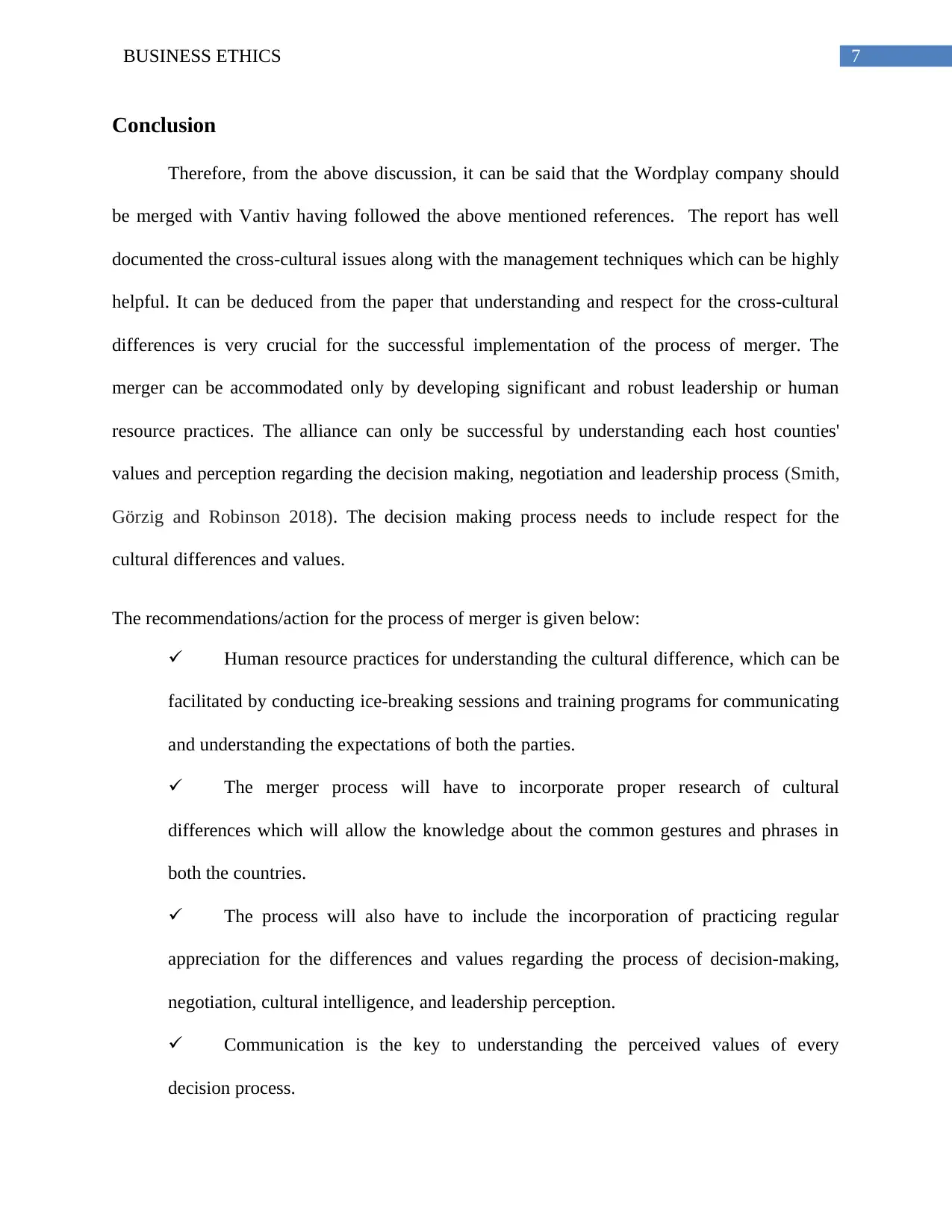
7BUSINESS ETHICS
Conclusion
Therefore, from the above discussion, it can be said that the Wordplay company should
be merged with Vantiv having followed the above mentioned references. The report has well
documented the cross-cultural issues along with the management techniques which can be highly
helpful. It can be deduced from the paper that understanding and respect for the cross-cultural
differences is very crucial for the successful implementation of the process of merger. The
merger can be accommodated only by developing significant and robust leadership or human
resource practices. The alliance can only be successful by understanding each host counties'
values and perception regarding the decision making, negotiation and leadership process (Smith,
Görzig and Robinson 2018). The decision making process needs to include respect for the
cultural differences and values.
The recommendations/action for the process of merger is given below:
Human resource practices for understanding the cultural difference, which can be
facilitated by conducting ice-breaking sessions and training programs for communicating
and understanding the expectations of both the parties.
The merger process will have to incorporate proper research of cultural
differences which will allow the knowledge about the common gestures and phrases in
both the countries.
The process will also have to include the incorporation of practicing regular
appreciation for the differences and values regarding the process of decision-making,
negotiation, cultural intelligence, and leadership perception.
Communication is the key to understanding the perceived values of every
decision process.
Conclusion
Therefore, from the above discussion, it can be said that the Wordplay company should
be merged with Vantiv having followed the above mentioned references. The report has well
documented the cross-cultural issues along with the management techniques which can be highly
helpful. It can be deduced from the paper that understanding and respect for the cross-cultural
differences is very crucial for the successful implementation of the process of merger. The
merger can be accommodated only by developing significant and robust leadership or human
resource practices. The alliance can only be successful by understanding each host counties'
values and perception regarding the decision making, negotiation and leadership process (Smith,
Görzig and Robinson 2018). The decision making process needs to include respect for the
cultural differences and values.
The recommendations/action for the process of merger is given below:
Human resource practices for understanding the cultural difference, which can be
facilitated by conducting ice-breaking sessions and training programs for communicating
and understanding the expectations of both the parties.
The merger process will have to incorporate proper research of cultural
differences which will allow the knowledge about the common gestures and phrases in
both the countries.
The process will also have to include the incorporation of practicing regular
appreciation for the differences and values regarding the process of decision-making,
negotiation, cultural intelligence, and leadership perception.
Communication is the key to understanding the perceived values of every
decision process.

8BUSINESS ETHICS
⊘ This is a preview!⊘
Do you want full access?
Subscribe today to unlock all pages.

Trusted by 1+ million students worldwide
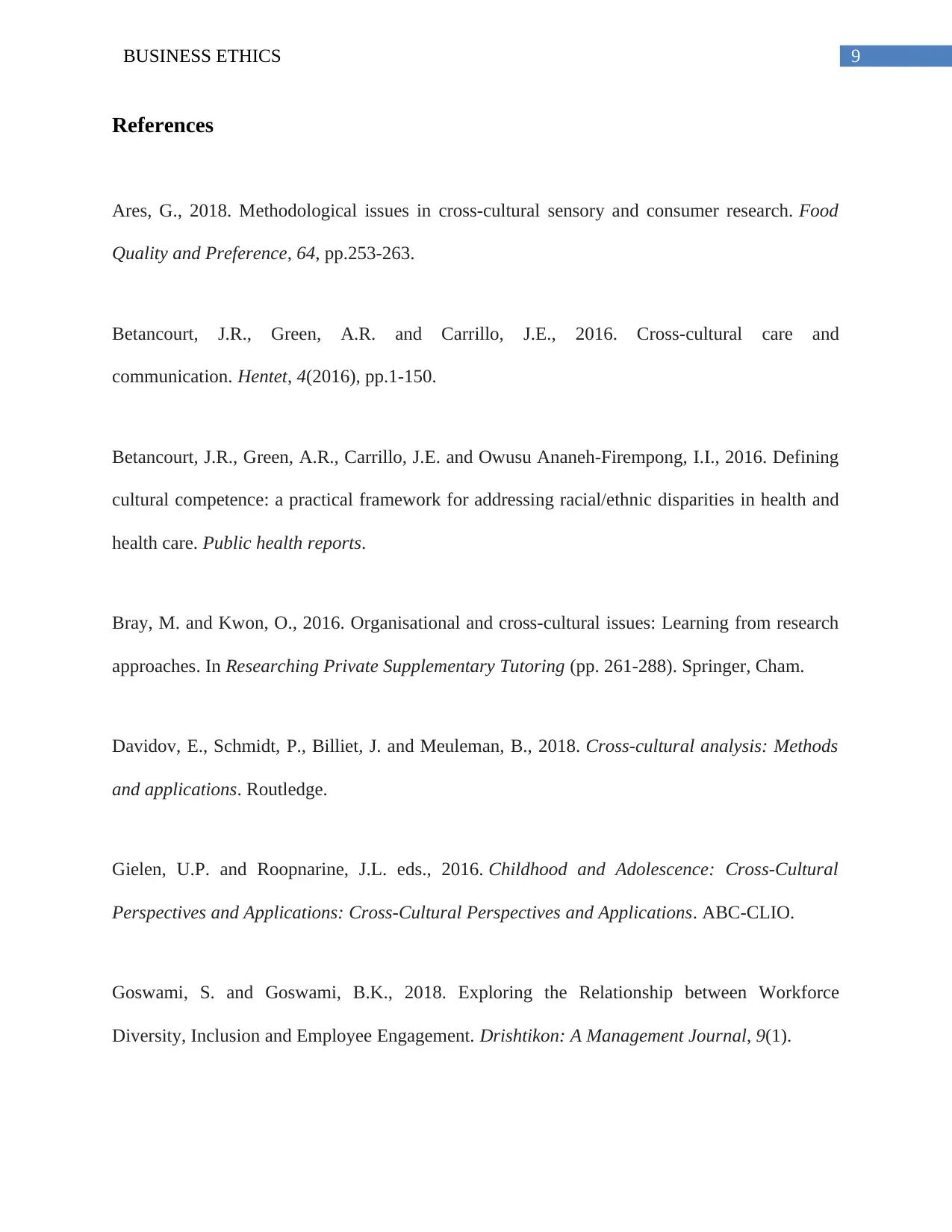
9BUSINESS ETHICS
References
Ares, G., 2018. Methodological issues in cross-cultural sensory and consumer research. Food
Quality and Preference, 64, pp.253-263.
Betancourt, J.R., Green, A.R. and Carrillo, J.E., 2016. Cross-cultural care and
communication. Hentet, 4(2016), pp.1-150.
Betancourt, J.R., Green, A.R., Carrillo, J.E. and Owusu Ananeh-Firempong, I.I., 2016. Defining
cultural competence: a practical framework for addressing racial/ethnic disparities in health and
health care. Public health reports.
Bray, M. and Kwon, O., 2016. Organisational and cross-cultural issues: Learning from research
approaches. In Researching Private Supplementary Tutoring (pp. 261-288). Springer, Cham.
Davidov, E., Schmidt, P., Billiet, J. and Meuleman, B., 2018. Cross-cultural analysis: Methods
and applications. Routledge.
Gielen, U.P. and Roopnarine, J.L. eds., 2016. Childhood and Adolescence: Cross-Cultural
Perspectives and Applications: Cross-Cultural Perspectives and Applications. ABC-CLIO.
Goswami, S. and Goswami, B.K., 2018. Exploring the Relationship between Workforce
Diversity, Inclusion and Employee Engagement. Drishtikon: A Management Journal, 9(1).
References
Ares, G., 2018. Methodological issues in cross-cultural sensory and consumer research. Food
Quality and Preference, 64, pp.253-263.
Betancourt, J.R., Green, A.R. and Carrillo, J.E., 2016. Cross-cultural care and
communication. Hentet, 4(2016), pp.1-150.
Betancourt, J.R., Green, A.R., Carrillo, J.E. and Owusu Ananeh-Firempong, I.I., 2016. Defining
cultural competence: a practical framework for addressing racial/ethnic disparities in health and
health care. Public health reports.
Bray, M. and Kwon, O., 2016. Organisational and cross-cultural issues: Learning from research
approaches. In Researching Private Supplementary Tutoring (pp. 261-288). Springer, Cham.
Davidov, E., Schmidt, P., Billiet, J. and Meuleman, B., 2018. Cross-cultural analysis: Methods
and applications. Routledge.
Gielen, U.P. and Roopnarine, J.L. eds., 2016. Childhood and Adolescence: Cross-Cultural
Perspectives and Applications: Cross-Cultural Perspectives and Applications. ABC-CLIO.
Goswami, S. and Goswami, B.K., 2018. Exploring the Relationship between Workforce
Diversity, Inclusion and Employee Engagement. Drishtikon: A Management Journal, 9(1).
Paraphrase This Document
Need a fresh take? Get an instant paraphrase of this document with our AI Paraphraser
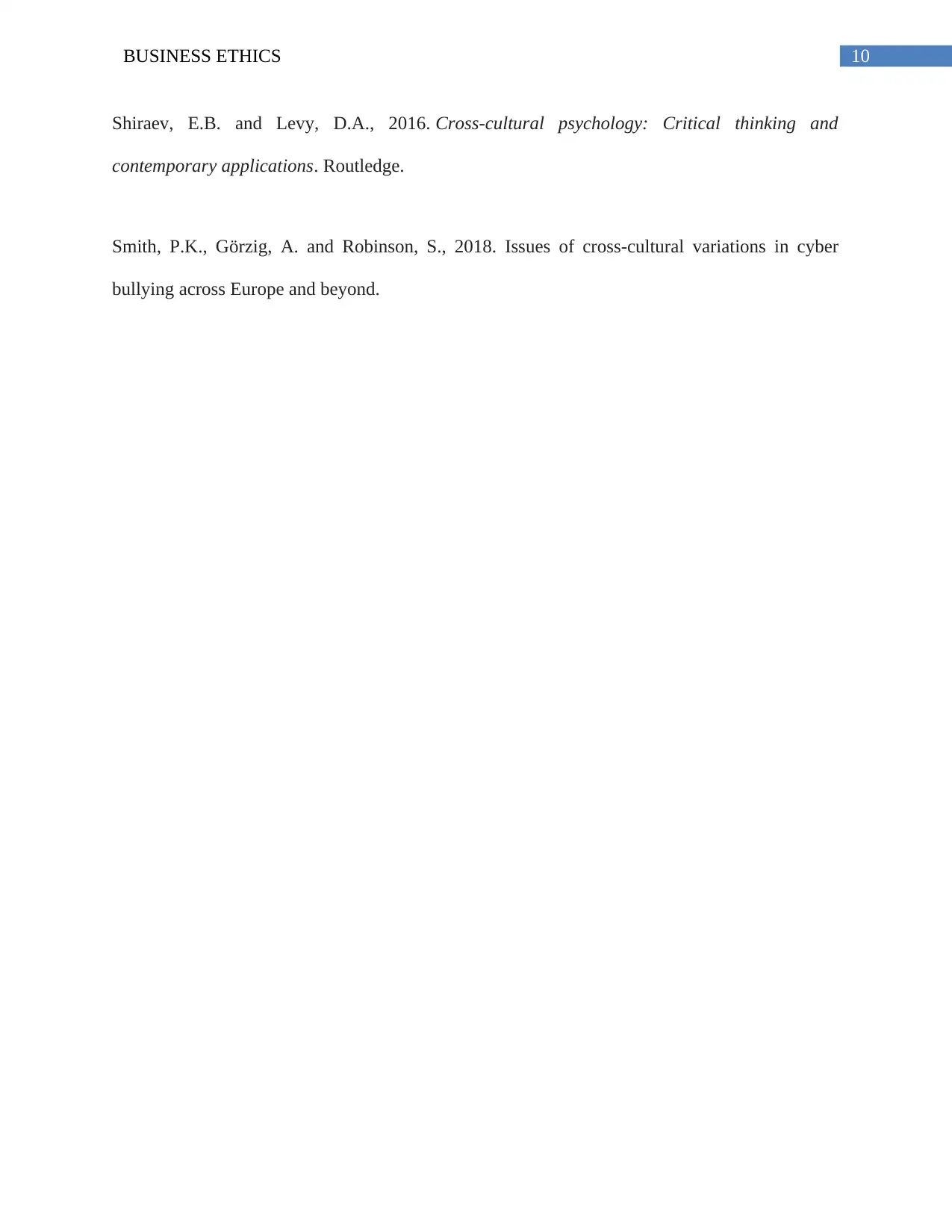
10BUSINESS ETHICS
Shiraev, E.B. and Levy, D.A., 2016. Cross-cultural psychology: Critical thinking and
contemporary applications. Routledge.
Smith, P.K., Görzig, A. and Robinson, S., 2018. Issues of cross-cultural variations in cyber
bullying across Europe and beyond.
Shiraev, E.B. and Levy, D.A., 2016. Cross-cultural psychology: Critical thinking and
contemporary applications. Routledge.
Smith, P.K., Görzig, A. and Robinson, S., 2018. Issues of cross-cultural variations in cyber
bullying across Europe and beyond.

11BUSINESS ETHICS
⊘ This is a preview!⊘
Do you want full access?
Subscribe today to unlock all pages.

Trusted by 1+ million students worldwide
1 out of 12
Related Documents
Your All-in-One AI-Powered Toolkit for Academic Success.
+13062052269
info@desklib.com
Available 24*7 on WhatsApp / Email
![[object Object]](/_next/static/media/star-bottom.7253800d.svg)
Unlock your academic potential
Copyright © 2020–2026 A2Z Services. All Rights Reserved. Developed and managed by ZUCOL.




